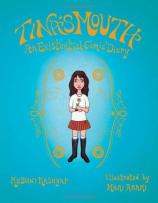Being and Mouthyness
Writer Keshni Kashyap discusses what makes her heroine, a high school sophomore discovering the philosophies of Jean-Paul Sartre, exist…and grow.
Was Tina in some ways based on your own experiences? Do some of her characteristics mirror yours?
Yes. Tina was definitely based on my own experiences—both from the schools I attended as well as life beyond high school. Some of her characteristics mirror my own (she's a little blunt; she has a spiritual, metaphysical inclination; she has existential malaise). But in many ways, she is also quite different. She is definitely cooler than I ever was in high school.
How did you and illustrator Mari Araki meet? And how did the two of you work together to coordinate the art and story throughout the book?
I wrote the script by myself and then we went back and forth, tightening, editing, changing and tightening again. The process took close to four years.
Tina clearly learns a lot throughout the course of the book and reaches a new level of maturity. One of my favorite scenes in the book is when Urvashi Auntie visits and breaks down Sartre for Tina. Is Urvashi Auntie based on anyone? What do you think of the viewpoint, and the explanation of Sartre, that she provides?
Well, Urvashi Auntie is sort of based on an Auntie I know. Regarding her explanation of Sartre: I had often heard and read that existentialism died when the existentialists died. I'm no philosophy PhD, but I have had a vague sense that there are parts of existentialism (i.e., authenticity; identity) that were dealt in more succinct ways by certain older religions/philosophies such as Hinduism and Buddhism. That scene with Urvashi Auntie is an attempt to address existentialism as a valid philosophy as well as the fissures within it. It's also meant to be a scene about a flawed, adult human being who has tried to live an authentic life and succeeded in some ways and failed in others. That sort of mandate is never simple and I felt it was important for Tina to see that.
Tell us about your own introduction to Jean-Paul Sartre. How old were you and what impact did it have on your life at the time?
I was fifteen when I was introduced to Sartre in an existentialism class in high school, just like Tina. I remembered the class discussions about life way more than Sartre himself or his take on the philosophy. Mostly, I remember that he was odd looking! I had to look at the nuances of his ideas more closely as an adult.
Tina is very wise for her age. This passage, in particular, really struck me: “I don’t think [Hollis and I] will ever be friends at Yarborough, but I have this feeling that one day, maybe years from now, maybe in a big city like New York, we’ll meet for coffee in a café and talk about love, death, and god…” That’s a very insightful realization for her to make. Do you think Sartre would be helpful for all teenagers, to help them make sense of what they’re going through?
My introduction to existentialism allowed me to ponder questions that weren't being asked anywhere else. Bigger questions. It planted seeds that perhaps led to more mature thinking. Maybe that passage is a reflection of that.
Combining Sartre with a YA novel, and then doing it as a graphic novel, is an interesting and inventive idea. Was it tough to find a publisher willing to take the chance on it?
I was very lucky to find an editor, Anjali Singh, who had a fantastic track record and had the clout to take a chance on the book. The book would never have happened without her faith and ideas. I do think that it is a very particular idea, and I'm glad you think it was inventive.
Would you do a sequel to the book? Would you like to revisit Tina’s character again? Or perhaps, given the announcement that occurs at the very end of the book, would you want to do a story focusing on different characters from the book?
I don't think we would ever do a sequel to the book. I would love to revisit Tina's character again, but perhaps in another form (i.e., a movie or TV) and there are other characters whose lives I would love to explore. I would certainly like to do another graphic novel and Mari and I have a few ideas that we're working on.
In particular, Reza is a very interesting character. While he’s often in the background, he remains a pervasive persona throughout. What inspired him as a character for you?
I grew up in a very multicultural environment and I guess that Reza is an example of a character that I grew up around, but have not really seen in modern fiction or movies! Of course, I imagine (and hope) that this will change.
What are you working on next?
I am working on a young adult novel, a series of short stories and a screenplay.





